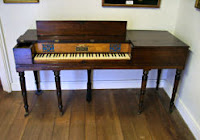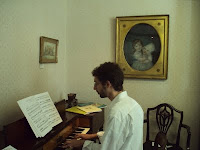Amanda McCabe is not feeling quite the thing today, so we offer a post from Angela James, Executive Editor at Carina Press. Angela (and her staff) are looking for historical manuscripts; details below, and good luck!
***
Hoop skirts, brocade, feathered headdresses, kid gloves, kid slippers, horses, carriages, talk of locomotion (not Kylie Minogue’s!), Queen Victoria, cowboys, discussion of women’s suffrage, ratafia, corsets, chemises, calling cards, pelisses, peers of the realm, cutthroats, Mary Wollstonecraft, six-shooters, hothouse flowers, wallflowers, parties lit by candles, cowboy hats, bluestockings, hunts, hounds, masquerades, horses, operas and operettas, tours of Italy, grand tours, wars (Napoleonic, Crimean), revolutions (French, Russian)…
Do you love these things? We do, and we want to read more about them—and share them with our readers! Carina Press’s acquisitions team and editors have begged me to find more historical fiction and romance, so I’m putting out the call. If you have a completed historical manuscript, 15,000 words and up, Carina Press would love to see it. We’re looking for both historical romance and historical fiction (with or without the romance subplot) of any steam level (including none, none at all). Historical Victorian, Regency, Western, turn of the century or whatever other time period you’ve chosen to write in, we’re interested in publishing some amazing historical work. Our submissions guidelines can be found at www.carinapress.com/submission-guidelines and we’re working through submissions very quickly, due to the large number of us reading them, so you won’t be waiting until summer (or next year) for an answer!
We hope you’ll take this post and pass it on, post it on your blog, direct your friends to it and let them know: Carina Press is looking for historical fiction and romance!
Want to know more about the people behind the Carina Press acquisitions and their love of all things historical? I asked them to share thoughts about favorite authors, books and just what they love about historical romance and historical fiction in general.
I’ll start (Angela James, Executive Editor): I love historicals for the things I learn. When I was in sixth grade, I visited the junior high, as a kind of orientation for the next school year. We were all assigned a seventh grade buddy, who we attended classes with for the day. In her history class, the teacher asked, “What was Queen Mary’s nickname?” I was the only one who knew the answer was “Bloody Mary” and that was because of the historical romances I’d been reading (yes, in sixth grade). I got mad props from the seventh graders (upperclassmen!) for knowing that answer!
I adore Julie Garwood’s old historicals and have for many years. They’re some of my very favorite re-reads, and books I will never give up because, even after all these years, they still make me laugh out loud, smile, and fall in love with both the hero and the heroine. Despite historical inaccuracies and what some might call a wallpaper-historical effect, I love them and I continue to recommend them to friends for the fun storylines and relatable characters.
Amy Wilkins, Acquisitions Team: I love The Secret History of the Pink Carnation by Lauren Willig for its incredible blend of adventure, comedy and romance.
(plus it amused me that the hero and heroine are named Amy and Richard — my boyfriend’s name is Richard!)
Melissa Johnson, Editor: I love Kresley Cole’s MacCarrick Brothers Trilogy because one of the heroines is actually not from France or the British Isles, and Cole’s heroes are all crazy-hot for the women they love. I don’t even mind that the brothers are each crazy-hot in basically the same way.
Deborah Nemeth, Editor: I love the sparkling prose and witty dialogue of Eloisa James. In the Desperate Duchess series she went beyond the typical Regency to the Georgian period, one that I love.
I’d also love to get some historical manuscripts set in the Italian Renaissance and the Tudor/Elizabethan courts that feature political intrigue. The Roman empire between Augustus-Claudius (the setting of the I, Claudius series) would also be good for this type of political story.
I’d also love an adventure story set during the Crusades–perhaps from the Saracen point of view. A romance featuring a troubadour during the time of Eleanor of Aquitaine. I also enjoy the roaring twenties, Paris during the Belle Époque, and England during both WWI and WW2.
Andrea Kerr, Acquisitions Team: You can quote me: “I admit it: I love historicals for the gowns!”
More seriously, one thing I really like about historical romance is that there is built-in conflict. Relationships between men and women were governed by very different and intricate social rules that simply could not be crossed. So it’s believable to me that the hero and heroine in a historical can’t be together because they are on different social levels, for example, or because they are unable to come out and say how they feel. In a contemporary romance, it takes a LOT more to convince me that two available people who are obviously attracted to each other can’t just sit down and work through their differences and be together.
Gina Bernal, Editor: I love the emotional depth of Mary Balogh’s historicals, because she takes characters to the lowest of low points and yet makes me believe time and again that love does conquer all. Lately, I’ve been hankering for a good harem romance and love all sorts of unusual settings and underexplored time periods–from Vikings, Romans and Celts to Caribbean pirates and WWII resistance fighters.
Emily Matheson, Acquisitions Team: I love Eloisa James. Everything she’s written. Not only do I love her characters (they’re always smart), but I always learn something– be it about politics in Georgian England or how migraines were treated in the regency period. It’s the best way to be educated.
Elizabeth Bass, Editor: I`d love to find an author who could single-handedly bring western historicals back into popularity!
Jenny Bullough, Acquisitions Team: Like most of us here at Harlequin, I’m a huge fan of Deanna Raybourn’s MIRA historicals, because as much as I love Regencies it’s a treat to read historical novels set in the Victorian era for a change! With Carina Press open to any and all eras and settings, I’m always excited to read submissions that are set in unusual or different eras or places — from ancient Rome or Egypt to turn-of-the-century America or WWII Japan, from the Salem witch trials to Renaissance Italy!!
Kymberly Hinton, Editor: I love Judith McNaught’s rich, evocative language because it makes me feel like I’m right there with the characters, and she’s the first author who helped me to realize that “reformed rakes make the best husbands.” I also adore Julia Quinn’s Bridgerton series because she has a rare ability to make me laugh, cry, and jump for joy all in the same book.
 I’m not able to pull off such elegant snark myself and I’d find it hard to act blasé about lakes. I love ‘em. I visited the Lake District several times during a three year international assignment in England. Windermere is lovely, but my favorite is probably Ullswater of Wordsworth’s “Daffodils” fame. My husband and I rented a canoe to go out there on a truly picturesque sort of day, when the weather couldn’t make up its mind to be fair or rainy. I loved the play of light over the water and surrounding hills and didn’t mind the sprinkle of rain that eventually sent us to seek a nice pub lunch in Glenridding. Later, I would set one of my early Regencies, THE INCORRIGIBLE LADY CATHERINE, in the same region.
I’m not able to pull off such elegant snark myself and I’d find it hard to act blasé about lakes. I love ‘em. I visited the Lake District several times during a three year international assignment in England. Windermere is lovely, but my favorite is probably Ullswater of Wordsworth’s “Daffodils” fame. My husband and I rented a canoe to go out there on a truly picturesque sort of day, when the weather couldn’t make up its mind to be fair or rainy. I loved the play of light over the water and surrounding hills and didn’t mind the sprinkle of rain that eventually sent us to seek a nice pub lunch in Glenridding. Later, I would set one of my early Regencies, THE INCORRIGIBLE LADY CATHERINE, in the same region. I am thinking of lakes because I’m currently planning a summer vacation in the Finger Lakes. Vacation planning helps me get through the cold, dark doldrums of January! Anyway, we were hoping to go to England last summer, but my husband’s stroke made it impossible to go anywhere. This year, I promised the family and myself that we would do something fun, even if not as ambitious.
I am thinking of lakes because I’m currently planning a summer vacation in the Finger Lakes. Vacation planning helps me get through the cold, dark doldrums of January! Anyway, we were hoping to go to England last summer, but my husband’s stroke made it impossible to go anywhere. This year, I promised the family and myself that we would do something fun, even if not as ambitious.








